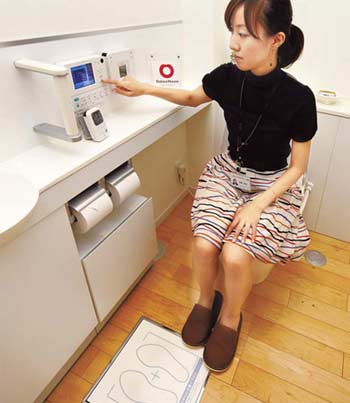|
 An employee of Japan's housing company Daiwa House demonstrates the company's latest model, called "Intelligence Toilet", manufactured by Toto, at Daiwa House show room in Tokyo. [Agencies] |
|
In Japan, the global leader in high-tech toilet design, the latest restroom marvel should come with a health warning for hypochondriacs -- it doubles as a medical lab that can really spoil your day. Japanese toilets have long and famously dominated the world of bathroom hygiene with their array of functions, from posterior shower jets to perfume bursts and noise-masking audio effects for the easily-embarrassed. The latest "intelligent" model, manufactured by market leader Toto, goes a step further and isn't for the faint-hearted: it offers its users an instant health check-up every time they answer the call of nature. Designed for the housing company Daiwa House with Japan's growing army of elderly in mind, it provides urine analysis, takes the user's blood pressure and body temperature, and measures their weight with a built-in floor scale. "Our chairman had the idea when he was at a hospital and saw people waiting for health checks. He thought it would be better if they could do the health tests at home," says Akiho Suzuki, an architect at Daiwa House. Toto's engineers developed a receptacle inside the basin to collect the urine for sugar content and temperature checks, and an armband to monitor blood pressure. The readout is displayed on a wall-mounted computer screen. "With the current model, your data is sent automatically to your personal computer, and then you can email it to your doctor," said Suzuki. "In the next generation model, the data will be sent automatically to family members or doctors via the Internet," she said. The electronic marvel, called the "Intelligence Toilet", is capable of storing the data of up to five different people and retails for 350,000 to 500,000 yen (about 4,100 to 5,850 dollars) in Japan, she said. "For now our customers are essentially middle-aged and senior people. But we hope the young generation will also become more health-conscious." The model is the latest advance in a string of sophisticated toilets, known as "washlets" in Japan, which have become ubiquitous in recent decades. (Read by Nelly Min. Nelly Min is a journalist at the China Daily Web site.) (Agencies) |
作為高科技馬桶設計方面的全球領先者,日本最新設計的一款馬桶能為那些懷疑自己生病的人敲響健康警鐘,不過這款兼有身體檢查功能的馬桶真的會讓你郁悶一整天。 長期以來,日本在衛生潔具方面一直處于世界領先地位,其所設計的馬桶因功能多樣化而聞名于世,這其中包括背部淋浴噴頭、香水噴灑裝置以及掩蓋人們在上廁所時發出尷尬聲音的遮音工具等。 這款最新的“智能”馬桶模型由知名衛具公司東陶公司制造,其功能上又有新突破,但不適合膽小者使用:因為這款馬桶每次都會對如廁者進行一次即時身體檢查。 這款馬桶為房產公司大和房建設計,考慮到日本日益壯大的老年人隊伍,這款馬桶兼有尿液分析、為使用者量血壓和體溫,并用其內置地秤位為使用者測量體重等多項功能。 大和房建的建筑師鈴木明步說:“我們的老板在一家醫院看見人們排隊等待體檢時產生了這一想法,他覺得如果人們能在家就做體檢會更方便。” 東陶公司的工程師們在馬桶上安裝了一種尿液收集器,用于檢測血糖和體溫,以及監控血壓的臂帶。檢查結果會在安裝在墻上的電腦屏幕上顯示出來。 鈴木說:“目前的模型能將你的數據自動傳輸到你的個人電腦上,然后你可以通過電子郵件發送給你的醫生。” 她說:“下一代模型則能將數據自動通過網絡發送給你的家庭成員或醫生。” 她說,這一被稱為“智能馬桶”的電子衛具能夠儲存五個人的數據,目前在日本的零售價格為每套35萬到50萬日元(合4100到5850美元)。 “目前我們的顧客主要是中老年人。不過我們希望年輕人也能更加重視自己的健康。” 這一模型是日本高科技馬桶系列“衛洗麗”的一款最新產品,近幾十年來,“衛洗麗”產品在日本已經相當普及。 相關閱讀 (中國日報網英語點津 陳丹妮 編輯:蔡姍姍) |
|
Vocabulary: hypochondriac: a person who suffers from hypochondria; hypochondria is a state in which somebody worries all the time about their health and believes that they are ill when there is nothing wrong with them(疑病患者) posterior: the part of your body that you sit on; your bottom(臀部;屁股) faint-hearted: lacking confidence and not brave; afraid of failing(膽怯的;怯懦的) answer the call of nature: 上洗手間 washlet: 自動噴水馬桶,衛洗麗 ubiquitous: seeming to be everywhere or in several places at the same time; very common(似乎無所不在的;十分普遍的) |
